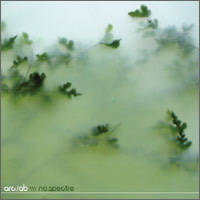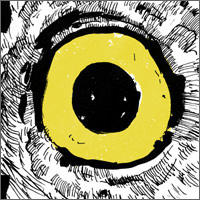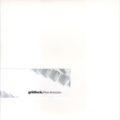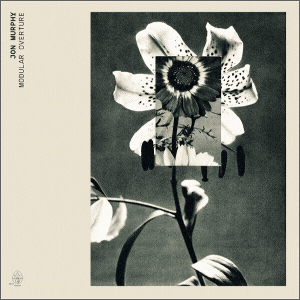(02.21.07) The term emotional has been spreading virus-like through the discourse surrounding electronica. It’s wielded, pinned on like a kind of badge of honour – a guarantee that something warm and fuzzy, something meaningful, is there in the musician-listener exchange. Meanwhile those labouring under the misapprehension that electronica is an affair of arid algorithms for soulless geeks are assured that music sprung from senseless circuitry and sinewaves rather than from hand-stroked or breathed-into objects can be human and heart-wrought just like any other.
Now n5MD is in the vanguard of emotional electronica, elevating the ghost in the machine to a starring role in its mission statement. But, not content with claims upon emotion, it also summons up something of a wind-in-the-hair renegade spirit through appeal to the experimental, a word that would once have induced shudders at the out-there conceptualist horrors it evoked: say, someone hammering contact-miked sheet metal while, perhaps, rolling a piano loaded with combustible material up a hill and letting it fall back down to an explosive end (the performance being billed Exploding The Myth of Sisyphus). Stuff like that. But no longer. We’ve clearly seen a deal of slippage in the use of the term experimental that would allow it to feature on the flag flown proudly on n5MD’s website (there are no burnt piano wrecks here, metaphorically speaking). So these properties (emotional, experimental) are conferred by association upon those grouped under the n5 flag. Now what if examination of these attributes – since they are clearly put forward as Good – were the basis for appraisal of these latest n5MD recordings?

Let’s take Arc Lab (aka Medard Fischer) and put his No Spectre to the test.
Now, first of all, let’s be clear: it’s not at all a bad release. It’s carefully put together, evinces a decent grasp of keyboard-based melody and sound manipulation, displaying capable beat-programming and proficiency with techniques of granular synthesis. But that’s not the point. It’s just that in all honesty, held up to the light, emotionally, it’s a relatively muted affair, plus, experimentally, it’s, to say the least, unadventurous. What do you get? Well, the latest version n5MD house-style is installed, with its increasingly familiar specs: ambient-electro-techno (Aphex-Arovane-Gridlock), sub-orchestral Nordic Euromanticism (Sigur Ros-Mum-Morr), and shoegaze-infused post-rock (MBV-Mogwai). Arc Lab is drawn roughly from these co-ordinates. Though it’s out of N. America, it could sit comfily alongside the last 3-4 years of product on UK labels like Expanding, Cactus Island, and Neo Ouija (RIP). Yes, there are too many similar voices vying for attention; yes distinctiveness is lacking; but mainly No Spectre fails to pass the ‘E’ Test. To qualify as emotional, some tinkling keyboards making delicate sad-happy pirouettes over a downbeat backdrop seems a bit scant. “The Several Song” introduces a female voice singing briefly, only for it to be softly glitched into fragments; despite this human entry, the emotional is still liminal. The whole thing is inhibited by its own delicacy and ultimately cloying over-pleasantness. The same voice reappears on “The Past!,” but still might as well be computer-generated for all the emotion it imparts. So, if No Spectre is allowed through as emotional, then you’d have to say that emotion here is compressed within a narrow range. As for its experimental quotient, not to over-egg the critical pudding, suffice it to say that mere avoidance of the more obvious trappings of conventional composition and sound architecture does not experiment make.
Tobias Lilja, though, is quite a different animal. He deals in “controlled desperation.” That’s his characterization of the emotional tenor of his second album – his first for n5MD, Time is on My Side. The Swede is, after all, a man who titled his Nonresponse debut Ex-leper – a chilly collection of alienated musical notes from/on a town in the advanced stages of slow extinction. Following Ex-leper, Lilja apparently ‘studied pop structures’ in order to be able to add vocals to his future work. What in the world of ‘pop’ might’ve been studied is a thing of mystery, but what has emerged is an arresting slab of vocal-infused electronica. Experimental because it feels questing, and has an air of the unwonted, of something being stretched towards, not necessarily at the outer limits, but still experimental does not seem out of place in its application.

Emotional too; admittedly, at the dejected end of the emotional spectrum, but, strangely, not dispiriting, perhaps working to cleanse through a musically-mediated form of catharsis. Thus Lilja presides, a figure like some new slant on the confessional guitar-strumming singer-songwriter of yore, over some weird personal ritual, exorcising ghosts to long-drawn out distressed textures. “Time, oh Time… will you heal me… please push me on…”, he almost-moans, before a brooding granular synthetic wailing wall. The neo-gothic vocal meditations float between medieval plainchant and incantation. Beats, when they come, are not the customary polite patter, but tend towards elemental throbs or insistent muffled thuddings, like on “My Authority”‘s steepling wave-wall of angst-filled, cascading pointillistic haze-noise. “Blood Tracer” takes a leaf out of the Loess/Bitcrush book, with one of those slo-mo trudge/plod kick-snare motifs over which gradually seeps controlled synthetic bleeding ever-rising in intensity.
Perceptible in this stylized neo-expressionism is a debt (acknowledged by Lilja) to David Sylvian, whose elegant bruised and sulky croon, if not richness of tone, is referenced in the mannered cadences of Lilja’s delivery. There’s a suggestion also that the Fenneszian contribution to Sylvian’s Blemish has had some influence on Lilja – a wall of what sounds like guitar-fuzz-glitch providing a regular backdrop over which Lilja spreads the mournful swoops and curlicues of a baritone voice which strains at the edges of its limited range and expressivity. He compensates for his instrument’s limitation by double and triple-tracking, heavily harmonizing and echo-dusting, to create a sombre density from a thin resource. On opener “A Ruthless Beast” he’s even ambitious enough to deploy background ghost-voicings redolent of Bowie’s wordless vocalese on “Warszawa” (Low).
Overall, Time… sounds sonically remote, enshrouded, like it’s been cultivated under a rain-sodden tarpaulin under which the earth has started to mulch and moulder, possibly in not entirely healthy ways. Inside this ferment, Lilja performs the emotional, in a naturalistic stylized manner, like an actor lurching between Method and Kabuki. He inhabits his music like it’s a lumpy sweater inside which it’s sweaty and uncomfy, but irretrievably his. The contrast with his label-mate is stark: Medard Fischer makes gestures at the emotional, his Lab describing a limited Arc. Like a non-native speaker operating in an acquired/learnt language, wielding the vocabulary but with a command of the idiom betrayed by stiffness and over-correctness, he is outside his vehicle straining towards the inside.
Thus No Spectre feels lightweight and ephemeral, forgotten as soon as the disc is through. Tobias Lilja’s Time…, in contrast, is weighty and effusive, its resonances reverberating in the memory’s ear long after its final note. In its totality, it’s a demanding listen, but it is more expressively articulated emotionally (‘E’ One) and takes the path less trodden (‘E’ Two).
Both No Spectre and Time Is on My Side
are out now on n5MD.


















![Allmanna Town :: 1911 EP (Self Released) — [concise]](https://igloomag.com/wp/wp-content/uploads/2025/03/allmannatown-1911_feat2-75x75.jpg)





